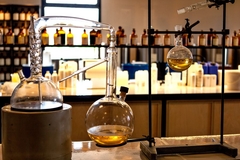
10 Dec 2021 --- A clinical study conducted by Mibelle Biochemistry has investigated the effects of its ingredients on common skin disorders, and a novel disorder the company refers to as “5G irradiation.” The study involved Alpine Rose Active, InfraGuard, KeraGuard and PhytoCellTec Goji ingredients It found the ingredients improved a range of ailments, such as scalp redness, itching, free radical damage and breast sagging.
Mibelle also claims that InfraGuard, derived from sunflower sprouts, combats what they believe is 5G-induced free radical formation and inflammation.
Each ingredient is derived from natural sources.
Effect of Ingredients
In the study, Mibelle found that its Alpine Rose Active reduced redness on the skin by 32.4%, and reduced scalp itching by 64.3% when applied regularly for four weeks. Mibelle’s KeraGuard was found to have protective and reparative properties for hair and nails. Specifically, it was found to protect against free radicals, and increase nail thickness.
In a study of 23 women, the company found that after using the product for 53 days, the women’s nails were up to 7.6% thicker when compared to the control group.
Use of the company’s PhytoCellTec Goji, derived from plant stem cell cultures, was thought to result in “an improved V-shaped face” and a lifted breast. According to previous Mibelle studies, the ingredient also improved collagen and elastin  The company investigated the effects of 5G waves on skin.production
The company investigated the effects of 5G waves on skin.production
Mibelle’s InfraGuard was said to protect the skin from Infrared and blue light irradiation.
Mibelle’s study also investigated the purported effects of 5G exposure. They said that InfraGuard could protect the skin from “free radical formation and inflammation” caused by the cellular network.
Investigating niche markets
According to Franziska Wandrey, head of research, “5G-induced free radical formation and inflammation’ means that we developed an in vitro assay with which we could demonstrate that 5G irradiation of skin cells (keratinocytes) leads to the formation of free radicals (as shown by the increase in reactive oxygen species (ROS)) and to an increase in inflammatory markers (as shown by the increase in IL-1beta).”
“Treatment with InfraGuard reduces the ROS and IL-1beta production caused by 5G irradiation in a dose-dependent manner.” In a nutshell, the product was thought by Mibelle to reduce or prevent oxidative stress, which the company believes can be caused by 5G waves.
The maker of MossCellTec Aloe adds on its website that the effects of 5G on the skin are yet to be validated by science at large. When asked if Mibelle had plans for other similar products, the company responded in the negative.
“We currently have no further products planned for this type of application. 5G protection is a very niche field which currently does not warrant several products targeting this.” says Wandrey.
By Olivia Nelson













